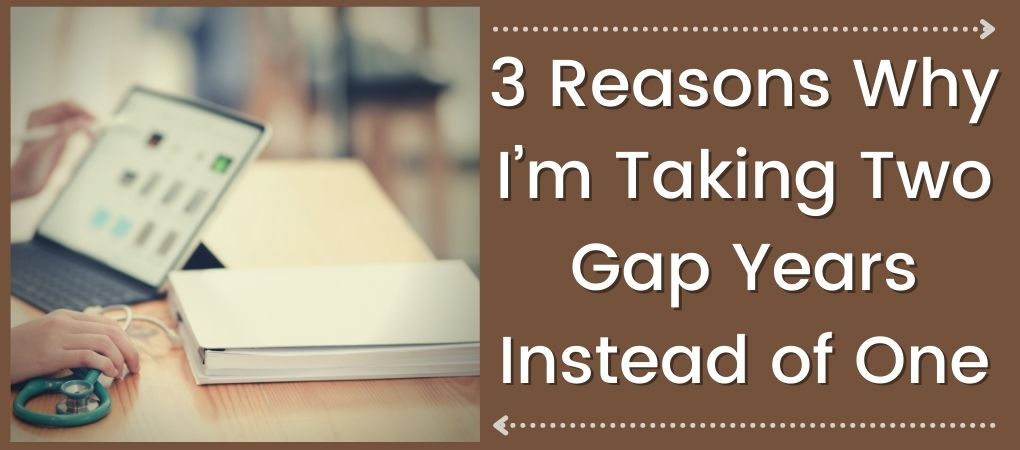3 Reasons Why I’m Taking Two Gap Years Instead of One

The decision to take one or multiple gap years is one that many pre-meds face. In fact, according to a 2019 survey, 65.2% of incoming medical students took gap years, with the majority having taken one or two gap years. In fact, two gap years is relatively common as the average incoming age of medical school students is 24.
On the “normal” application timeline, students submit their medical school applications during the summer before their senior year, and they spend their senior year interviewing and deciding on a school. Gap years push this timeline out so that you are applying at some point after graduation.
There are a multitude of reasons why students want to take gap years. Many students take the time to gain experiences for their application or to be able to take the MCAT and apply to medical school without the pressures of a college semester. Others need time to decide if medicine is the path they want.
My decision to take two gap years was not an easy one. In a society where succeeding and constantly advancing your career is so valued, it can be hard to decide to pause for a few years. However, for me, I felt that I needed the time for a variety of reasons.
Gap Year vs. Application Year
When I first met with my university’s pre-med advisor about taking a gap year, he made sure that I understood the difference between a gap year and an application year.
If you are a senior graduating in May and applying to medical school in June, then that whole year off from school is really an application year. Any additional experiences you gain will not show up on your medical school application since it is submitted so early. Applying immediately after graduation is really taking a year to apply to medical school, on top of whatever else you might do during that time.
If you are hoping to gain experiences to add to your medical school application, those experiences need to be completed or at least started before you submit your application. This is where taking two gap years allows you time to further your application before actually applying.
This distinction helped in my decision, and I think it is where I first began considering two gap years.
Reason 1: Timing
There are three main reasons why I ended up choosing two gap years over one (or none). The first reason relates to the timing of when I decided to go to medical school versus when the application cycle started.
While I started my undergraduate career as a premedical student, I did doubt my decision often. It took me a few years to become confident that medicine is what I wanted to pursue. It was not until late in my junior year that I had completely decided.
In order to meet the traditional timeline, this would have meant rushing to take the MCAT, get letters of recommendation, and apply in just a few months. I knew this would not result in a very competitive application, and I wanted time to do everything correctly, so I knew that I needed to take at least one gap year.
I took the MCAT that summer after my junior year, knowing that my score would be valid long enough for me to take one or two gap years.
Reason 2: Experience
The second reason for me taking two gap years was to gain more experience for my application, which I believe is one of the most common reasons.
While I had lots of research and volunteering experience in college, I understood that my clinical and shadowing experience was lacking. I knew that taking more time before applying would allow me to further those areas of my application.
While I in no way expect to have a “perfect” application or everything medical schools are looking for, it is important to me to put myself in a good position. Not only that, but I know that gaining shadowing and clinical experience is a great way to reaffirm my decision to enter the field of medicine.
There are a wide variety of ways to gain experience in your gap years in order to further your application. For me, I plan to work a clinical job and get shadowing hours on days off.
Reason 3: Time Off
The third and perhaps the largest reason why I chose two gap years is that I wanted a break from school. I wanted time to enjoy my other hobbies and interests before becoming very busy for the years of medical school and residency.
I am someone who likes to keep a full schedule, especially while I was in college. Between clubs, officer positions, classes, and sleep deprivation, being a student can become quite draining at times.
I expect medical school to be far worse in terms of how busy I am, so I liked the idea of getting a break from classes and having an opportunity to do things outside of the scope of education and universities.
Moreso than a break from school, it is really important for me to have extra time to enjoy living life. One of my most significant reservations in becoming a physician is the time commitment. Having little to no free time for the bulk of my twenties and beyond is a big sacrifice.
Taking these two years to do lots of things that I enjoy helps me reconcile that. I see it as “filling up my tank” with adventures and travel before going into a few years where those activities will be challenging to fit in.
I am using this time to do lots of hiking and camping, traveling (if it becomes safe to do so), enjoying time with friends and family, and exploring new hobbies. Life can be short, and I didn’t want to wait until years down the line when my schedule might lighten up. I knew these experiences were possible for me right now if I took gap years.
What To Do During Your Gap Year(s) Before Medical School
As I noted above, there are a variety of options to fill up your gap year(s).
You can use the time to gain the necessary experience to improve your medical school application. This includes getting clinical/research experience, or just shadowing. You can also take the time to do more volunteering, research, or other activities that you feel would benefit you.
In addition, gap years can be a great time to do dedicated MCAT studying, or to work on your medical school applications when you have a bit more free time.
Gap years are also a great chance to live life and enjoy your twenties. There aren’t many times in your life when you can take multiple years “off” relatively easily. It is important to take advantage of this and enjoy yourself so that you can enter medical school with renewed energy and focus.
Finally, you can use the time as an opportunity to work to save up. Medical school is expensive. According to Education Data, the average total student debt among medical school graduates is $241,600. Working to save so that you don’t have to take out as big of a loan can be beneficial to your payments, especially during residency/fellowships when you aren’t making as much.
On top of medical school tuition and debt, the cost of applying to medical school itself has a huge price tag. Between primary and secondary application fees, as well as the cost of flights and lodging for interviews, it can cost up to $8,000 to apply to 30 schools and go on three interviews. Without being in school, you can work more hours to save up this money.
Doubts
It can be daunting to choose to take time off. Seeing friends and peers going directly onto jobs, grad school, and even medical school is difficult. It is hard not to feel like you are falling behind or not good enough.
Know that this is not true. You are on no one’s timeline but your own. What matters is that you do what you need. While I struggled a lot with feeling like I had gotten “off track,” I also knew that I would regret not taking this time for myself.
Furthermore, I know multiple medical students who speak of how advantageous taking gap years is. They say it is easy to tell which of their peers took gap years and which didn’t. It gives you a chance to face the challenges of life away from school. You figure out how to navigate being on your own, having a job, paying bills, etc., all before adding the pressure of being in medical school.
Never forget that taking gap years is no sign of weakness. Getting into medical school is a massive achievement regardless of when it happens.
Conclusion
The decision to take one or more gap years is very personal, and the reasoning is different for everyone. Nevertheless, I hope that my reasons have helped you see the benefits of gap years and help you recognize some of your own needs.
I am just at the beginning of my time off, so I cannot yet speak to its outcome. However, I have no regrets so far. I have already had incredible experiences that would not be possible as a medical student. I am on my way to gaining the clinical experience I need, and I know I will have plenty of time to dedicate to the application cycle when it comes around.
Not everyone needs or wants to take a gap year. For those of you considering it, I wish you the best in your deliberation and decision. Focus on your wants and needs, both as an applicant and as an individual.

Leave a Reply